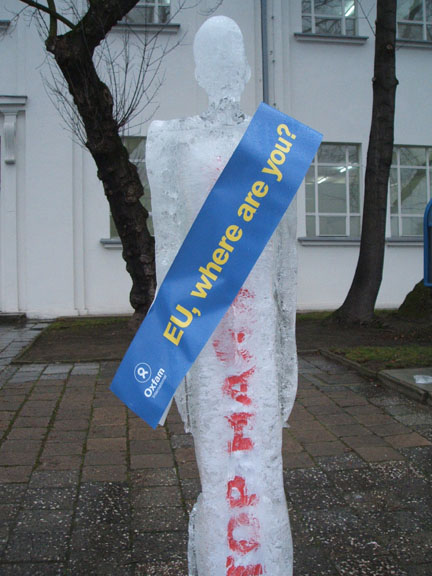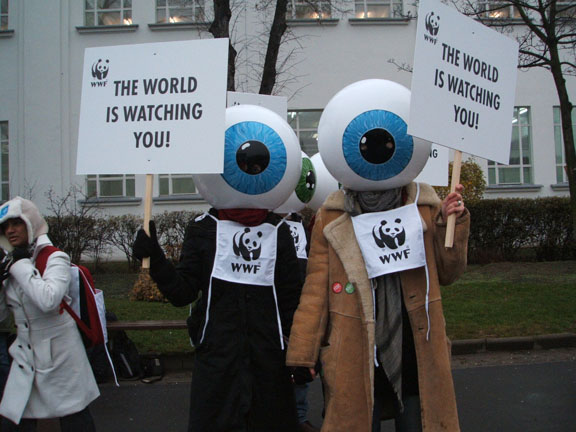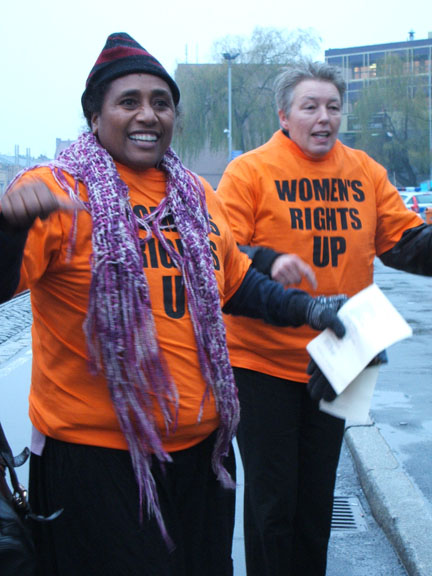
While the UN celebrated the 60th anniversary of the Universal Declaration of Human Rights last Dec. 10, various groups stepped up pressure on rich countries to curb carbon emissions that have been blamed for climatic disasters in developing nations, and provide funding for projects that will help poor people adapt to the impact of climate change.
Their attention-getting strategies ranged from distributing paper sunglasses asking world leaders to “Stop harming, stop helping” to chanting in the corridors for the inclusion of women and indigenous peoples’ rights in a new climate treaty set to be forged in Copenhagen next year.
“Human rights provide an alternative to the assumption that everything – from carbon to malnutrition—can be priced, compared, and traded,” according to an Oxfam report. The aid group estimates that $50 billion is needed for adaptation efforts.
The amount is a far cry from what is currently available in the UN-supported Adaptation Fund, which is dependent on a two per cent levy on climate-friendly projects in developing nations that are funded by industrialized countries to gain carbon credits.
Hours before the conference was due to close Friday, negotiators finally agreed on the details of the fund, which is intended to help poor nations cope with climate change. Earlier, UN climate chief Yvo de Boer had said the Adaptation Fund is one of the critical issues under discussion in Poznan.
Negotiators have decided to allow developing countries to get direct access to the fund, currently estimated at $60 million, starting next year. Many delegates and environment groups have been asking rich countries to pour in more money to the fund.
 “This could be the one thing to come out of Poznan,” said Kit Vaughan of World Wildlife Fund-Britain.
“This could be the one thing to come out of Poznan,” said Kit Vaughan of World Wildlife Fund-Britain.
Presidential adviser on climate change Heherson Alvarez, head of the Philippine delegation in Poznan, has blamed “creeping climate change” for destructive storms that ravaged many parts of the country in 2006.
He said climate trends in recent years showed that tropical storms in the country had increased in frequency and strength. In 2006, super typhoon Reming packed 320 kph winds and killed more than 700 people, according to weather bureau statistics.
“Climate change is upon us. We are feeling the brunt of its impact through no fault of our own,” Alvarez said. “It’s the carbon-guzzling lifestyle that’s inflicting this on us.”
Rajendra Pachauri, chairman of the Intergovernmental Panel on Climate Change which has won a Nobel prize for its work, said greenhouse gas emissions have risen by 70 per cent between 1970 and 2004. Human activities such as industrialization and car use have contributed much to the sharp increase, contributing to extreme weather events.
“Climate change currently contributes to the global burden of disease and premature deaths. Adverse health impacts will be greatest in low income countries,” Pachauri said.
More than 100 Catholic bishops from various countries launched a worldwide campaign over the weekend to call for “urgent action and moral responsibility” in assisting poor people who have been affected by climate change.
“We have seen a rapid increase in the need for relief efforts and emergency food supplies over the past few years,” said Bishop Theotonius Gomes from Bangladesh. He said a quarter of the estimated 200 million climate refugees in the next 10 years are expected to come from his country.

“We strongly support efforts to put human rights at the heart of the climate debate,” Abdull said.
In a forum last Dec. 3, indigenous leaders from various countries also called for a human rights-based approach in dealing with the impact of climate change.